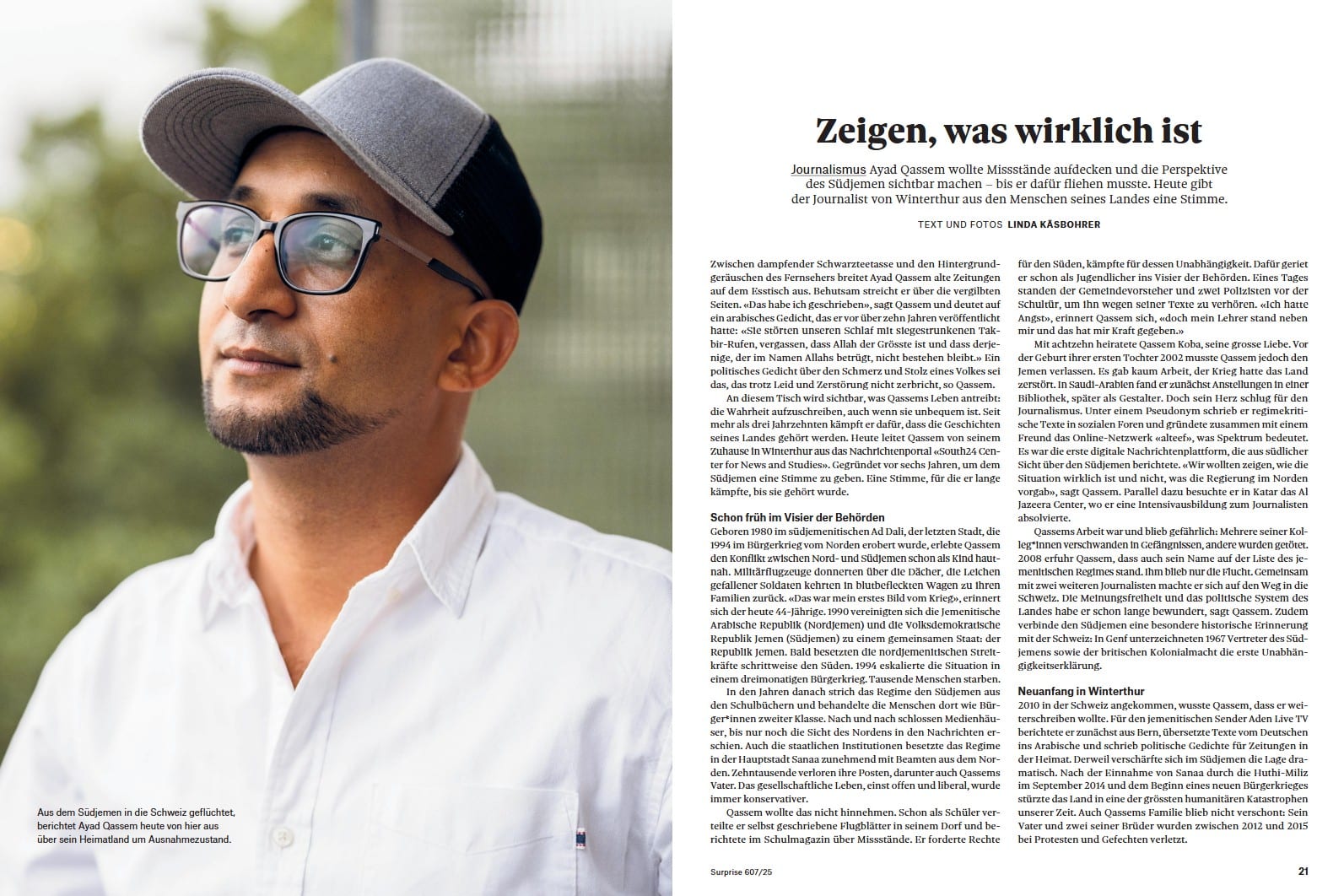
Three-year-old Abdul Karim, in Shaab camp for displaced people, Aden Governorate (UNHCR/Ahmed Al-Mayadeen)
آخر تحديث في: 11-01-2024 الساعة 4 مساءً بتوقيت عدن
“The escalation directly impacts the shipping costs of commodities heading to Yemen, which imports most of its needs from abroad. A bigger escalation leading to the closure of Bab al-Mandab will cause a severe food crisis in Yemen.”
Abdullah Al-Shadli (South24)
The escalation in attacks by Iran-backed Houthis on commercial shipping in the Red Sea and Bab al-Mandab Strait has badly hit maritime commerce in the busy waterway, which is likely to lead to the spiraling in costs of essential commodities in Yemen and more hardship for its people.
A Yemeni businessman, residing in China, revealed to ’South24 Center’ regarding the massive negative impact of the escalation in attacks by the Iran-backed Houthi militia in the Red Sea and Bab al-Mandab. He said this will likely aggravate the severe economic and humanitarian crisis in Yemen, where 17 million Yemenis in 2023 were on the verge of starvation according to the United Nations.
Related: Yemen in 2023: Hope flickers despite hardships, annual report
Businessman Abdulmalik Al-Haddad added that the shipping costs of the 40-feet containers from China to the Port of Aden had increased from $3,000 on November 22, 2023, to $6,200 on December 19 and jumped to $11,000 on December 25. On January 4, 2024, the prices ranged between a high of $9,600 to $9,950.
As for the Port of Al-Hodeidah, which is under Houthi control on the Red Sea coast, the shipping costs have risen from $4,950 on November 22 to $7,800 on December 19, and jumped sharply to approximately $12,700 on December 25 and to $11,550 on January 4.
These statistics are part of the repercussions following the escalation in Houthi attacks on some commercial ships plying in the Red Sea area since November 19. This includes the seizure of a vessel by the Houthis in the Port of Al-Hodeidah in November. These attacks raise the pertinent question as to what extent has the Houthi escalation contributed to the growing levels of poverty and hunger among the Yemenis?
Supply chains
Al-Haddad believes that the Houthi escalation in the Red Sea “unsettles the supply chains in a way that impacts the prices and the flow of products as well as the commercial, industrial and economic processes, especially since we are approaching the Chinese holiday season that extends to almost the entire month of February”.
He explained: “Most commodity inflows during January and February are related to the Ramadan season. Therefore, the prices of goods and products are expected to sharply increase at the next Ramadan.”
The Houthi attacks and the consequent obstruction of the navigation flow affects all Middle Eastern ports in general. However, the navigation flow in the Red Sea has been the most affected, marking an increase of about 350% in the ports of Aden and Jeddah in particular as well as the ports of Aqaba (in Jordan) and Egypt.
Al-Haddad pointed out that “due to the problems in the Red Sea and Bab al-Mandab Strait, most navigation companies have shifted their course towards the Cape of Good Hope (in South Africa) and some of them have rescheduled their trips. The fall in supplies along with the ongoing high demand on containers are a reason behind these mad prices.”
On December 17, Bloomberg reported that: “the number of vessels that entered the Gulf of Aden was 58, which is 70% less than the average daily rate during the first half of December in terms of the size of ships, and 30% less regarding their numbers.”
Bloomberg added: “The so-called war risk insurance increased 10 times what it was before the Houthi attacks.”
Abu Bakr Baobaid, the Deputy Head of Federation of the Yemen Chambers of Commerce and Industry and the Chairman of the Chambers of Commerce and Industry in Aden, confirmed the rise in shipping costs regarding the Port of Aden. He told ’South24 Center‘: “There is a real increase of up to 300%. However, the situation hasn’t been much different in the Port of Aden due to the big decline in its activities and the decreasing number of ships heading to it, even months before the turmoil began in the Red Sea.”*
He believes that “any solution that doesn’t prioritize forcing the Houthis to carry out de-escalation in the Red Sea will be futile”.
Food prices
Ahmed Bazarah, a food merchant in Aden, expressed his concerns about the hike in food prices as a result of the Houthi attacks in the Red Sea. He told ’South24 Center‘: “Many ships prefer not going to Yemen amid this crisis. Many Yemeni merchants who deal with China and other states have become incapable of shipping through the Yemeni ports.”
Bazarah indicated that the rise in insurance costs on the ships heading toward the Yemeni ports will also impact the living conditions of people in Aden and Yemen in general.
With regard to the food commodities affected by the Houthi maritime escalation, Abu Bakr Baobaid said: “The impact isn’t clear yet because the requests (for food) made after the escalation haven’t been delivered so far.”
Exacerbation of the crisis
Moustafa Nasr, Chairman of Studies and Economic Media Center, Yemen, said that “the repercussions of the Houthi attacks in the Red Sea will continue for some time. Restoring the navigation activities in the Red Sea is a difficult task as the international shipping companies have changed the course of their vessels toward the Cape of Good Hope.”
He added: “The escalation directly impacts the shipping costs of commodities heading to Yemen, which imports most of its needs from abroad. A bigger escalation leading to the closure of Bab al-Mandab will cause a severe food crisis in Yemen.”
On Wednesday (January 10), the Houthis announced, that they had launched an attack on the US naval forces in the Red Sea on Tuesday. This came hours after a statement by the US Central Command declaring that American naval units and a British military ship had thwarted a Houthi drone and missile attack.
In the latest development, the US and UK have hinted they could take military action against Yemen's Houthi rebels, after they repelled the largest attack yet on Red Sea shipping.
Carrier-based jets and warships shot down 21 drones and missiles launched by the Iran-backed group on Tuesday night.
Meanwhile, the UN Security Council passed a resolution on Wednesday demanding an immediate end to the Houthi attacks.
The International Chamber of Shipping has said that 20% of the world's container ships are now avoiding the Red Sea and using the much longer route around the southern tip of Africa instead.
The Houthis said they targeted a US ship on Tuesday providing support to Israel. It was the 26th attack on commercial shipping in the Red Sea since November 19.
* The Houthi militia, in a bid to tighten their hold on Yemen, have made a calculated move to control the flow of goods and redirect imports away from the vital Port of Aden, located on the southern coast, and divert them instead to the Port of Hodeidah, on the Red Sea coast. This deliberate maneuver has inflicted severe economic hardships on the already vulnerable Yemeni citizens, pushing them deeper into the abyss of poverty.

قبل 3 أشهر

قبل 3 أشهر

قبل 3 أشهر